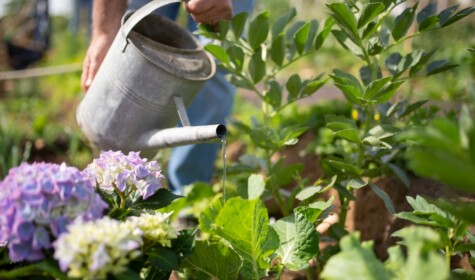“People talk about losing themselves in their gardens and that’s made possible by this sense of being ‘held’ by the garden… you can come out of a session of gardening and feel in a very different place in yourself.” These are the words of author and psychiatrist, Sue Stuart-Smith, during a session at ORFC earlier this year, where she told the story of her grandfather, traumatised by war but healed by the restorative power of the garden, as part of her book, The Well-Gardened Mind: Rediscovering Nature in the Modern World.
Beyond the idea of specifically viewing the garden as a place of sanctuary and means of escape from the rest of the world, Stuart-Smith also discussed, in a much broader sense, the power of the natural world as a whole: “…we overvalue verbal communication; there are so many other levels on which the natural world communicates with us, and if we tune into it, we can respond to that”.
Green social prescribing
There’s now an overwhelming collection of evidence which advocates for the benefits of utilising green spaces and interacting with nature to aid poor mental and physical health, otherwise known as green social prescribing. Research reveals that benefits can include, but aren’t limited to, improved concentration, reduced risk of developing cardiovascular diseases, better social connections and feelings of being connected to nature. It also reduces the overprescribing of medicines and associated adverse drug reactions, which have been linked to 1,708 deaths a year.
Dr Michael Dixon, Chair of The College of Medicine, described the advantages and potential of social prescription as “limitless”. The College of Medicine launched the Beyond Pills Campaign in response to the Chief Pharmaceutical Officer’s National Overprescribing Review, published in 2021, which revealed the extent to which medicine was being prescribed to patients in the UK, subsequently creating a culture of “a pill for every ill”. The review found that 10% of drugs being prescribed to patients were unnecessary and may cause harm, and that at least 15% of the population were taking at least five drugs per day, often using one drug to treat the side effects of another. The review concluded that tackling overprescribing could achieve benefits “comparable to a new blockbuster medicine”.
The impact of COVID-19 on our relationship with green spaces
The benefits of green spaces and nature were perhaps most notable when access to them became severely limited at the beginning of 2020, as a direct result of the COVID-19 pandemic and subsequent lockdowns. During this already trying time, it felt as though we’d been shut off from the outside world, told to stay at home, with outdoor exercise restricted to just once a day, and the formidable ‘rule of six’ that meant only six people were permitted to meet outdoors at a time – concepts which, thankfully, now feel rather alien to us.
Even when it was illegal, it perhaps came as no surprise when hundreds of people broke COVID-19 restrictions to gather in their local parks and green spaces, all desperate for the same taste of freedom and respite that came with these kind of environments: “At this time of chaos in the world of people, nature was a constant.” People wanted to connect with nature by any means necessary: page views from the webcams of 47 wildlife trusts across the UK – offering just a glimpse of wildlife, such as a nest or burrow – saw an increase of 2,024% from 20,407 to 433,632 in 2020, from 23 March to 31 March, compared to the same period in 2019.
Green social prescribing in practice
In July 2020, just months after the first COVID-19 lockdown in the UK, then environment secretary, George Eustice, proposed a plan for environmental recovery. In his speech, the former secretary announced that £4 million would be invested into a two-year green social prescribing pilot scheme, later in the year. Activities under the realm of green social prescribing include nature-based activities such as walking, community gardening and food-growing projects. The scheme would launch in urban and rural areas that had been most affected by the pandemic, with the intention to increase the scale of the project in the future. More money has since been invested into the scheme and seven ‘test and learn’ sites have been set up across England to assess how communities connecting with nature, through green social prescribing, can improve mental health, with a full evaluation of the project expected at some point this year.
Recent research completed by the department of health and social care, exploring perceptions of green social prescribing among clinicians and the public found that “nearly all clinicians would refer patients to social prescribers in the future” and the majority of patients were open to discussing opportunities for spending time in nature to support their mental health.
Access to these spaces where nature-based activities can take place to tackle health issues is just as important however, with research revealing that equitable access to green spaces in England could save the NHS £2.1 billion every year. Inequalities in access to green space became particularly prevalent during the pandemic, when, for some, their daily outdoor exercise meant a walk around their local park or time to unwind in their own gardens, whilst others were restricted to a small balcony, with no local green spaces available within a walkable distance. Yet, this problem persists beyond the pandemic; as of May 2022, according to the Fields in Trust Green Space Index, 2.8 million people in the UK live more than a 10-minute walk from a public park.
In an attempt to tackle this problem, DEFRA announced earlier this year as part of their five year roadmap for a cleaner, greener country, and building on the vision of the 25 Year Environment Plan, published in 2018, that they were committed to ensuring that every household would be within a 15-minute walk of green space, such as woodlands, parks and rivers.
Another avenue for green social prescribing: farms
With awareness growing and clear evidence supporting green social prescribing, it’s no wonder that other avenues for green rehabilitation are being explored. Working alongside The College of Medicine and researchers from the University of Bristol, we’ve been launching our own green social prescribing pilot, working with two regenerative farms and a number of local GP practices to assess what kind of impact farms and involvement in farm-based activities can have on people’s mental health.
Having been recognised as a possible solution to overprescribing of medicines, the importance of social prescribing initiatives, green or otherwise, cannot be overestimated. It could alleviate pressure on our already severely under resourced and under valued NHS, and has already proven in other countries to be one of the most cost-effective health measures. Could the answer to our ever burgeoning physical and mental health crises be, quite literally, all around us?
If you’d like to find out more about our green social prescribing farms project, listen to Head of Projects, Bonnie Welch, on Cardigan Radio’s The Climate Resilience show here. Click the first episode (01/12) and skip ahead to 21 minutes.







